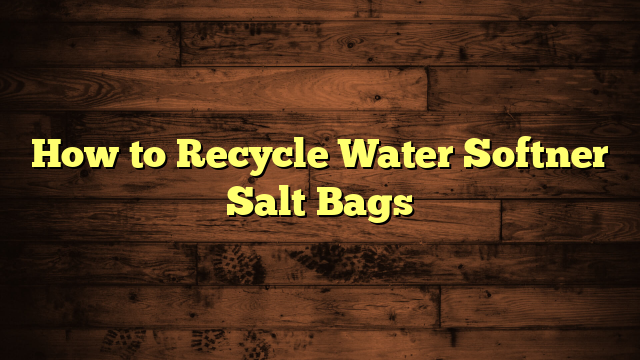How to Recycle Water Softner Salt Bags
You might not realize it, but the way you handle your empty water softener salt bags can greatly impact the environment. By ensuring they're free of residues and checking local recycling options, you can contribute to a more sustainable practice. However, if recycling isn't feasible in your area, there are creative ways to repurpose these bags that could benefit you and your garden. Curious about how to make the most of these bags once they've served their primary purpose? Let's explore some practical solutions.
Key Takeaways
- Check local recycling guidelines to determine if plastic salt bags are accepted in curbside collection or retail drop-off programs.
- Ensure bags are completely empty and lightly rinse them to remove any residual salt before recycling.
- Inspect bags for damage; only intact bags should be recycled to avoid contamination.
- Consider repurposing salt bags into garden waste containers, plant pots, or reusable shopping totes instead of throwing them away.
- Participate in community collection drives or educational workshops to promote recycling awareness and responsible disposal practices.
Understanding Water Softener Salt Bags
Water softener salt bags are essential for maintaining your home's water quality. When you use a water softener, you're combating hard water, which contains high levels of minerals like calcium and magnesium. The right salt types can make a significant difference in how effectively your system works.
You might find different options, including rock salt, solar salt, and evaporated salt, each offering unique benefits. Rock salt is often the most economical choice, but it may contain impurities.
Solar salt, harvested from evaporated seawater, is generally purer and dissolves well, making it a popular option. Evaporated salt, on the other hand, is the purest form available and often recommended for peak performance.
Understanding these salt types helps you choose the best product for your water softener. Generally, you'll want to avoid using table salt, as it can introduce additives that harm your system.
Maintaining the proper salt level in your water softener guarantees it operates efficiently, giving you softer water that's better for your skin, hair, and plumbing.
Materials Used in Salt Bags
When you're using water softener salt, you mightn't think much about the bags they come in, but these materials play a vital role in both functionality and recycling.
Most salt bags are made from plastic, which affects how they can be recycled and their overall environmental impact.
Understanding the common materials used in these bags will help you explore the best recycling options available and make more informed choices.
Common Bag Materials
Salt bags come in various materials, each designed to handle the weight and moisture of their contents. You'll often find bags made from plastic, paper, or a combination of both.
Plastic bags, typically made from polyethylene, offer excellent bag durability, which helps them withstand the heavy load of salt. These bags are resistant to moisture, preventing clumping and ensuring the salt remains dry.
On the other hand, paper bags tend to be more eco-friendly but may not handle moisture as effectively. They're often lined with a plastic coating to enhance their durability and protect the contents. This layered material composition can help create a balance between environmental considerations and the practicalities of salt storage.
Some brands even use woven polypropylene, a sturdy material that combines the benefits of plastic and paper. These bags are lightweight yet strong, making them a popular choice for heavy-duty applications.
Understanding these common bag materials is essential when considering how to recycle salt bags responsibly. By knowing what your bag is made of, you can better decide the best recycling method and contribute to a more sustainable environment.
Environmental Impact Considerations
Understanding the materials used in salt bags not only helps you choose the right recycling method but also highlights the environmental implications of those choices. Many salt bags are made from plastics, which can contribute considerably to waste if not disposed of properly.
When you consider your sustainability practices, it's crucial to think about how these materials impact your ecological footprint. Plastics can take hundreds of years to decompose, releasing harmful chemicals into the soil and waterways. By opting for bags made from recyclable materials or those that break down more easily, you can minimize your impact on the environment.
Furthermore, understanding the composition of these bags allows you to make informed decisions about recycling. If you're dedicated to reducing your ecological footprint, consider the entire lifecycle of the products you purchase. This means evaluating not just the salt inside but also the packaging it comes in.
Every small choice contributes to a larger effort toward sustainability. By being mindful of the materials in salt bags, you're taking a proactive step in promoting a healthier planet for future generations.
#
Recycling Options Available
How can you effectively recycle water softener salt bags?
First, it's important to recognize that most water softener salt bags are made of plastic, often polyethylene. This material is recyclable, and you can contribute to recycling initiatives by ensuring you handle these bags correctly.
Instead of tossing them in the trash, look for local recycling programs that accept plastic bags. Many grocery stores offer drop-off bins specifically for this purpose.
If curbside recycling is available in your area, check if they accept plastic bags, as guidelines vary.
Recycling these bags not only helps in waste reduction but also encourages a more sustainable community.
You might also consider repurposing the bags at home; they make excellent garden waste liners or storage solutions for small items.
## Recycling Options Available
Wondering what to do with those empty water softener salt bags? You've got several recycling options that can help you contribute to local recycling initiatives. Many communities have programs specifically designed for recycling plastic bags, including those used for water softener salt. Here's a quick overview of your options:
| Option | Details |
|---|---|
| Retail Drop-off | Many grocery stores accept plastic bags for recycling. Check with your local store! |
| Curbside Collection | Some municipalities include plastic bags in their curbside recycling. Confirm with your local guidelines. |
| Community Programs | Look for local recycling initiatives that focus on plastics. They might accept bags as part of their efforts. |
| DIY Projects | Consider repurposing bags for crafts or garden use. Get creative! |
| Local Recycling Centers | Some centers have specific drop-off days for plastic products, including softener salt bags. |
Preparing Bags for Recycling
Before you toss those empty water softener salt bags into the recycling bin, it's important to prepare them properly. Effective bag preparation is key to guaranteeing your recycling efforts actually contribute to environmental sustainability.
Start by emptying each bag completely, as leftover salt can contaminate the recycling stream. Give the bags a good shake to remove any residual salt.
Next, inspect the bags for any tears or damage. If they're intact, proceed to rinse them out lightly with water to eliminate any remaining particles. This step is essential for proper salt bag handling, as clean bags are more likely to be accepted by recycling facilities.
After rinsing, let the bags dry completely before recycling. Once dry, flatten the bags to save space in your recycling bin. This reduced bulk not only helps with storage but also makes it easier for recycling centers to process them.
Finally, check your local recycling guidelines to determine if there are specific requirements for bag preparation in your area. By taking these steps, you'll guarantee that your water softener salt bags are ready for recycling and make a positive impact on the environment.
Local Recycling Centers
Finding the right local recycling center can greatly simplify the process of recycling your water softener salt bags.
By choosing a center that offers specialized recycling services, you'll not only help reduce waste but also contribute to community involvement.
Here's how you can locate the best recycling options in your area:
- Research Online: Use search engines to find local recycling centers that accept plastic bags. Many centers list their accepted materials online.
- Check with Your Municipality: Your local government website often provides information on recycling services, including drop-off locations and collection events.
- Visit Local Retailers: Some grocery stores or retailers have dedicated recycling bins for plastic bags, making it easier for you to recycle your salt bags while shopping.
Creative Reuses for Salt Bags
Water softener salt bags can be surprisingly versatile once you think outside the box. Instead of tossing them in the trash, consider how you can use them for some fun DIY projects and gardening uses.
For instance, these sturdy bags can serve as excellent garden waste containers. When you're tidying up your yard, simply fill them with leaves, grass clippings, or small branches.
If you're into crafting, you can cut the bags to create unique, waterproof plant pots. Just add drainage holes and fill them with soil and your favorite flowers or herbs. You can even use the bags to protect your garden from weeds by laying them flat and covering them with mulch.
Another creative option is to transform the bags into reusable shopping totes. Just cut the bags to your desired size, add some handles, and you've got yourself a durable tote for your next trip to the farmer's market.
With a bit of imagination, water softener salt bags can be much more than just containers; they can become valuable tools in your DIY and gardening endeavors.
Environmentally Friendly Practices
When it comes to recycling water softener salt bags, you can adopt some environmentally friendly practices that make a difference.
Consider creative reuse ideas that transform these bags into practical items around your home.
Furthermore, check for local recycling programs that might accept these materials, helping you reduce waste while supporting your community.
Creative Reuse Ideas
How can you give new life to those empty water softener salt bags? Instead of tossing them in the trash, why not explore some creative reuse ideas?
These bags can be transformed into fun and functional items through simple upcycling projects. Here are three engaging DIY crafts you can try:
- Garden Planters: Cut the bags open, fill them with soil, and plant your favorite flowers or herbs. They're durable and can add a quirky touch to your garden.
- Storage Solutions: Use the bags for organizing your garage or shed. They're perfect for storing tools, gardening supplies, or even pet food. Just label them for easy identification.
- Reusable Grocery Bags: With a bit of sewing, you can turn these sturdy bags into reusable grocery totes. This not only helps reduce plastic waste but also gives your shopping a unique flair.
Local Recycling Programs
If you're looking for ways to dispose of those empty water softener salt bags responsibly, local recycling programs offer a great solution. Many communities have local initiatives designed to manage plastic waste effectively.
By participating in these programs, you not only help reduce landfill contributions but also support eco-friendly practices in your area.
Start by checking with your local waste management authority or recycling center to see if they accept plastic bags. Some places have specific drop-off locations or designated collection days for recyclable materials.
Engaging in community involvement through these programs can foster a sense of responsibility and encourage others to do the same.
Additionally, some local retailers participate in bag recycling initiatives, making it even easier for you to recycle your water softener salt bags.
Encouraging Community Recycling
Many communities are discovering the benefits of recycling water softener salt bags, and you can play an important role in this effort. By getting involved in community engagement and supporting recycling initiatives, you help create a cleaner environment.
Here are three ways you can encourage community recycling:
- Organize a Local Collection Drive: Gather your neighbors and set up a designated spot for collecting used salt bags. Promote this event through social media, flyers, and word of mouth to raise awareness.
- Educate Your Community: Share information about why recycling salt bags is essential. Host workshops or informational sessions to explain the environmental impact and the recycling process.
- Collaborate with Local Businesses: Partner with local businesses to provide drop-off locations for salt bags. This collaboration can create a convenient recycling option while promoting community participation.
Frequently Asked Questions
Can I Compost Water Softener Salt Bags?
You can't compost water softener salt bags, as they're often made from plastic. Instead, consider eco-friendly alternatives like reusable bags or explore composting techniques for organic waste to reduce your environmental impact effectively.
Are There Any Safety Concerns With Salt Bags?
Aren't you curious about the safety concerns with salt bags? You should take safety precautions when handling them, as improper disposal can harm the environment and potentially cause pollution. Always check local guidelines for proper disposal.
How Can I Identify Recyclable Materials in Salt Bags?
To identify recyclable materials in salt bags, check local recycling guidelines. Look for symbols or labels indicating recyclability, and remember that materials like plastic or paper may vary based on your area's specific recycling rules.
What Are the Consequences of Not Recycling Salt Bags?
Not recycling salt bags increases landfill waste, which contributes to environmental impact. You're allowing plastic to accumulate, harming wildlife and ecosystems. By recycling, you help reduce this burden and promote a healthier planet for everyone.
Can I Reuse Salt Bags for Storage Purposes?
Absolutely, you can reuse salt bags for storage purposes! They make handy storage hacks for organizing small items. Just consider bag alternatives if you want something more durable or aesthetically pleasing for your space.
Conclusion
Recycling water softener salt bags isn't just about reducing waste; it's like planting seeds for a healthier planet. By emptying, rinsing, and following local guidelines, you're contributing to a cleaner environment and setting an example for your community. Remember, every small effort counts. Whether you choose to recycle or repurpose, you're helping to create a cycle of sustainability. So, take that extra step and watch how your actions ripple out, inspiring others to join in!







